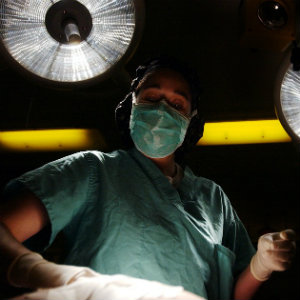Are you unable to work because of a work-related injury or illness? You may be wondering:
- Does my injury qualify for Workers' Comp?
- What if I'm permanently disabled?
- What should I do if my WC claim was denied?
- Do I have grounds for a lawsuit?
Our knowledgeable work injury lawyers are dedicated to protecting injured workers.

We're proud to fight for fair compensation for all types of job-related injuries and illnesses.
Being forced to miss time from work due to a job-related injury or illness can be frustrating, painful, and stressful. The recovery process is difficult enough in and of itself, but watching your utility bills and medical expenses pile up without a regular paycheck adds additional anxiety. Fortunately, any injury or illness which can be directly attributed to your job duties qualifies for Workers' Compensation benefits when you're forced to miss days at work.
Most work-related injuries and illnesses can be separated into two categories: those which occur due to a workplace accident, and those which slowly develop over time. Both categories qualify for Workers' Comp benefits. In either case, in order to receive benefits, you must prove that the injury or illness was caused by your work conditions and that it has impaired your ability to perform your job duties.
Requirements For A Claim
Establishing a link between your injury and work conditions is all about providing detailed medical evidence and filing appropriate paperwork by deadlines. If you're suffering from a work-related health problem, you should meet with a doctor immediately. This is important both for beginning the healing process and for documenting your condition for the claims process. We recommend requesting an initial medical report from your doctor shortly after your initial appointment and continuing to receive periodic treatment.
You also must make sure to file a report with your employer as soon as possible. Even promptly filed claims are frequently disputed. This is why many workers require the assistance of an experienced work injury lawyer to receive the full benefits they're entitled to.
FREE CONSULTATION
Injuries Which Commonly Require Workers' Comp Or Social Security Disability Benefits
At Monheit Law, we have experience representing injured workers in a wide variety of industries. We're prepared to earn compensation for any type of work-related injury or illness, but there are certain conditions which more frequently result in claims:
Back & Spinal Cord Injuries
Back injuries are some of the most common reasons employees miss time at work. According to the Occupational Safety and Health Administration (OSHA), each year about 600,000 workers are affected by back injuries.
These injuries can be the result of a singular accident, such as a fall from scaffolding on a construction site. However, many workers slowly develop back injuries due to repetitive micro-trauma. For example, a warehouse worker who spends his shifts lifting and carrying heavy boxes could slowly develop a debilitating back injury. Office workers who sit at their desks with poor posture could also develop back problems.
Because of the slow onset of many of these injuries, many workers may not report the injury until symptoms become severe. If you have noticed any back pain or discomfort, it's important to seek medical attention in order to prevent your condition from worsening.
Traumatic Brain Injuries (TBI)
Traumatic brain injuries occur when an outside force makes an impact with the head and disrupts brain function. This most often occurs in working environments which involve the use of tools, heavy machinery, or motor vehicles.
Construction workers are at a risk of suffering a TBI if they're struck by falling objects or a piece of heavy machinery. Truck drivers, transportation workers, and other workers who drive for a living often suffer these injuries in motor vehicle accidents. Workers in other types of environments could suffer TBIs in slip and fall accidents.
Any worker who has sustained a blow to the head should seek medical attention immediately.
Fractures & Broken Bones
Bone breaks and fractures can easily impair your ability to return to work. These injuries usually require rest and keeping pressure off of the fracture. Accidents which frequently result in broken bones include:
- Motor vehicle accidents
- Slips and falls
- Struck by falling objects
- Struck by equipment or heavy machinery
Eye Injuries
Eye injuries are common in industrial occupations and those involving exposure to chemicals and hazardous substances. According to the National Institute for Occupational Safety and Health (NIOSH), each year approximately 700,000 workers suffer eye injuries. It's extremely important to wear protective eye equipment if you're employed in a job which involves flying particles or objects.
Amputations
Losing a limb in a workplace accident can permanently prevent you from working and have serious detrimental effects on your life outside of work. These injuries qualify for additional specific loss Workers' Comp benefits, which are often paid in a lump sum.
Workers in manufacturing are at the highest risk of a workplace injury requiring amputation, followed by construction workers.
It's important that amputees receive full compensation for the extensive medical bills and other related expenses they will face for the rest of their lives.
Shoulder Injuries
Shoulder injuries are common in occupations which require heavy lifting, repetitive motions, the use of vibrating tools and machinery, and working from uncomfortable positions.
These injuries can occur in isolated incidents or develop slowly over time due to repetitive stress. In either situation, it's crucial to provide extensive medical evidence that your injury is related to your job duties.
Knee Injuries
Knee injuries are common in physically active jobs, such as construction, electrical work, and plumbing. Knee injuries can also develop from working in uncomfortable decisions, such as jobs which require standing and working on your feet all day.
Neck Injuries
Neck injuries can be caused both by a traumatic accident or by repetitive stress. For example, an occupational driver may sustain whiplash in an on-the-job accident. Additionally, office workers often develop chronic neck pain due to sitting with poor posture.
Burn Injuries
Burn injuries are some of the most devastating workplace injuries. Burn victims often require extensive medical care, including long hospital stays, surgery, and homecare once they're released from the hospital. Many are also permanently scarred both physically and emotionally. Recovering from a burn injury is extremely painful and expensive, and requires full benefits under Workers' Compensation.
Repetitive Motion Injuries
Many jobs require the repetition of the same movements over and over again each shift. Over time, these repetitive motions can slowly build up trauma and cause serious injuries, health conditions, and disorders. This applies both the strenuous physical labor like construction work as well as relatively minor tasks such as working at a computer.
Common examples of repetitive motion injuries include:
- Carpal tunnel syndrome
- Tendinitis
- Bursitis
Just because repetitive motions are a part of your job doesn't mean you should be forced to work through a repetitive motion injury. It's important to take time off to recover so that you can continue working to the best of your abilities. These injuries qualify for the same compensation as any injury incurred in a workplace accident.
Hearing Loss
Workers in certain industries are regularly exposed to dangerous levels of noise, which often cause permanent hearing damage. Specifically, industries which involve the use of power tools and heavy machinery are at the highest risk. Those who work in manufacturing, construction, and the music business should be especially wary and make sure to always use protecting hearing equipment.
Don't just assume that your hearing loss is a natural product of aging. As soon as you notice any degree of impairment, you should meet with a doctor to discuss preventing future hearing loss and to determine if your hearing damage is work-related.
Muscle, Nerve, & Tendon Injuries
Muscle, tendon, and nerve injuries are some of the most common workplace injuries requiring missed days. Workers may damage these body parts in sudden accidents, but many of these conditions build up over time. Common injuries include:
- Strains, sprains, and tears
- Shoulder and rotator cuff injuries
- Back pain
- Repetitive motion injuries like carpal tunnel syndrome
Paralysis
A paralyzing work injury changes someone's life forever, both personally and professionally. In many cases, these unfortunate victims are never able to work again and require Social Security disability benefits. These injuries often require a lifetime of care and paralyzed workers deserve to be fairly compensated with the full benefits they're entitled to.
Mental Health Conditions
Physical conditions aren't the only injuries and illnesses which require Workers' Comp. If you're suffering from mental health problems due to stressful or traumatic work experiences, you may qualify for benefits. Mental health problems can be just as debilitating as physical ones and can similarly limit your ability to work.
Exposure-Related Illnesses
Workers in environments which require the use of toxic chemicals and other hazardous substances are at risk of developing various exposure-related illnesses. Examples include exposure to asbestos, mold, or chemicals without proper protection. If you've developed a serious health condition which you suspect is related to your work environment, you should file a report with your employer and seek medical attention immediately.
How Can Injured Workers Receive Fair Compensation?
In Pennsylvania, virtually every employer is required to provide Workers' Compensation insurance for all of their employees. The Workers' Comp system is designed to simplify compensation by guaranteeing coverage to workers, regardless of how they were injured. In exchange for providing this coverage, your employer is usually protected from personal injury lawsuits after a workplace injury.
Workers who are unable to work in any job for a year or more may also qualify for Social Security disability benefits.
However, it is often difficult to win a claim for either of these forms of benefits. Injured workers may get confused by a complex claims and appeals process, and employers and insurance companies look for any reason to deny a claim. These entities will have lawyers on their side who are very skilled at denying coverage.
In order to give yourself the best chance at receiving maximum compensation, it's often necessary to have your own experienced legal counsel. At Monheit Law, we're proud to stand up for the rights of injured workers. We can help you gather everything you need for a successful claim and to use our knowledge of this system to take on the insurance company so that you can get the compensation you need while recovering from your injury.
Supplementary Work Injury Information
Monheit Law Montgomery County Office 215-866-2018
Directions to our Montgomery County Injury Law Office
4V4Q+FM Jenkintown, Pennsylvania
Open 24 hours
Workplace injury attorney Jenkintown
Civil law attorney
Employment attorney
Law firm
Attorney
Social security attorney
Monheit Law South Philly Office 215-302-0095
Directions to our South Philly Injury Law Office
WRCH+CP Philadelphia, Pennsylvania
Open 24 hours
Workplace injury attorney South Philly
Civil law attorney
Employment attorney
Law firm
Attorney
Social security attorney
